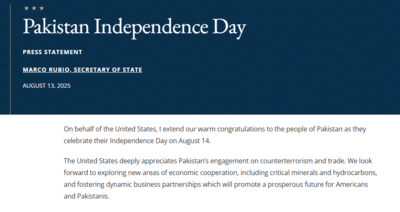United States secretary of state Marco Rubio on Thursday congratulated Pakistan on its Independence Day, "appreciating Islamabad's engagement on counterterrorism and trade".
Rubio also reiterated US President Donald Trump's ambition to "explore new areas of economic cooperation in critical minerals and hydrocarbons" between the US and Pakistan.
"On behalf of the United States, I extend our warm congratulations to the people of Pakistan as they celebrate their Independence Day on August 14," Rubio said in a statement.
He further said: "The United States deeply appreciates Pakistan’s engagement on counterterrorism and trade. We look forward to exploring new areas of economic cooperation, including critical minerals and hydrocarbons, and fostering dynamic business partnerships which will promote a prosperous future for Americans and Pakistanis."

Rubio’s remarks come amid what observers describe as a noticeable warming in Washington–Islamabad ties under Trump, a shift drawing close attention in New Delhi.
Over the past year, the US and Pakistan have expanded their engagement beyond "counterterrorism" and trade to include cryptocurrency ventures, crude oil shipments, and cooperation on rare earth minerals.
The renewed camaraderie between both nations follows heightened tensions between India and Pakistan after New Delhi’s retaliation for a Pakistan-backed terror attack in Jammu and Kashmir’s Pahalgam. Indian forces, acting against cross-border terrorism, destroyed multiple terror infrastructure in Pakistan, including the hotbeds like Bahalwalpur and Muridke.
As the tension escalated, the Indian forces stepped up the retaliation -- bombing the Rahim Yar Khan Pakistani Air Force (PAF) base in Pakistan's southern Punjab region and Nur Khan air base in Rawalpindi, which prompted the US to intervene.
Notably, the US has also used Nur Khan air base during the the Afghanitan war.
Later, Trump, without credible evidence, repeatedly credited himself with easing potential conflict between the two nuclear-armed neighbours, while publicly praising Pakistan’s military leadership and advancing trade deals, including Islamabad’s first-ever imports of US crude oil.
Experts suggest the renewed focus is “less about oil than access to minerals and rare earths,” which are crucial to the US economy and defence industries. The timing, alongside deeper military cooperation and high-level diplomatic praise, signals that strategic, economic, and geopolitical factors are all in play.
Rubio also reiterated US President Donald Trump's ambition to "explore new areas of economic cooperation in critical minerals and hydrocarbons" between the US and Pakistan.
"On behalf of the United States, I extend our warm congratulations to the people of Pakistan as they celebrate their Independence Day on August 14," Rubio said in a statement.
He further said: "The United States deeply appreciates Pakistan’s engagement on counterterrorism and trade. We look forward to exploring new areas of economic cooperation, including critical minerals and hydrocarbons, and fostering dynamic business partnerships which will promote a prosperous future for Americans and Pakistanis."
Rubio’s remarks come amid what observers describe as a noticeable warming in Washington–Islamabad ties under Trump, a shift drawing close attention in New Delhi.
Over the past year, the US and Pakistan have expanded their engagement beyond "counterterrorism" and trade to include cryptocurrency ventures, crude oil shipments, and cooperation on rare earth minerals.
The renewed camaraderie between both nations follows heightened tensions between India and Pakistan after New Delhi’s retaliation for a Pakistan-backed terror attack in Jammu and Kashmir’s Pahalgam. Indian forces, acting against cross-border terrorism, destroyed multiple terror infrastructure in Pakistan, including the hotbeds like Bahalwalpur and Muridke.
As the tension escalated, the Indian forces stepped up the retaliation -- bombing the Rahim Yar Khan Pakistani Air Force (PAF) base in Pakistan's southern Punjab region and Nur Khan air base in Rawalpindi, which prompted the US to intervene.
Notably, the US has also used Nur Khan air base during the the Afghanitan war.
Later, Trump, without credible evidence, repeatedly credited himself with easing potential conflict between the two nuclear-armed neighbours, while publicly praising Pakistan’s military leadership and advancing trade deals, including Islamabad’s first-ever imports of US crude oil.
Experts suggest the renewed focus is “less about oil than access to minerals and rare earths,” which are crucial to the US economy and defence industries. The timing, alongside deeper military cooperation and high-level diplomatic praise, signals that strategic, economic, and geopolitical factors are all in play.
You may also like

Katie Price calls for Peter Andre sit down talk over one thing that will end Princess feud

'Serious nuclear incident' at Faslane Royal Navy base deemed 'Category A' threat

5 Reasons Why the Kawasaki KLX230 Could Win You Over Against the Hero XPulse 210

CM Yogi refutes school closure claims; highlights UP's education, employment gains

Bihar SIR row: SC asks Election Commission to upload data of voters omitted in draft list






